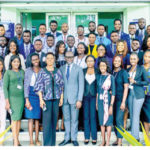Nigeria as a nation is becoming similar to Chinua Achebe’s “Things Fall Apart.” The country is being ravaged by many challenges: insecurity, poor power supply, poverty and unemployment among other issues, leading to continual agitations for secession.
A brief journey down the history of Nigeria would add an exciting quality to this intellectual banquet. The remote cause of Nigeria’s civil war, which raged between 1967 and 1970, was ethnic animosity, which reigned in the country then. That war led to enormous loss of lives and the ruination of our country’s economy and infrastructures. Till now, we are still rallying from the disastrous effects of that destructive war. But have we built unity and national solidarity from the hollow of that war?
The answer to the question is no. Nigeria is still a disunited country which is sundered apart by the divisive factors of religious differences/conflicts and ethnic rivalry. Nigeria, which has more than 250 ethnic groups, is an amalgam of ethnic and sub-ethnic groups which are highly incompatible. It is a blend of diverse ethnic nationalities, which are unsympathetic of one another. That is why disunity with its resulting effects of underdevelopment has been our lot for a long time.
What then is the way forward? Is it the cry for separation? Yes, Yoruba (Oduduwa), Igbo (IPOB), and Hausa (Arewa) are agitating for separation. Yoruba nation on its own is a region in the western part of Nigeria which constitutes the people in the six states of Nigeria including, Lagos, Osun, Ondo, Oyo, and Ogun. These people speak the language called “Yoruba”. These States before their birth falls under the western region during the colonial era.
I am of the opinion that this daily cry for secession must be put under the check of the theory of dualism. Dualism in metaphysics is the belief that there are two kinds of reality and in this case, we go for good and bad. Thus, the agitation for separation by the Yoruba nation should be viewed from both its good and bad sides. It is naturally true that it is advantageous if we are united. But has this not been our mantra for ages without any improvement? Shall we then go our separate ways? Well, we need to go back to the drawing board as a country. It is true that Nigeria embraced and adopted federalism as a solution to the moving forces of ethnic rivalry and nationalism and the issue of religious conflicts. More so, our adoption of the federalist structure ought to have afforded the component units in our country the opportunity to develop at their own pace.
But sadly, Nigeria is not practicing true federalism. Our federalism can be perceived as a very ugly caricature of what federalism ought to be. I therefore take the side that until we practice true federalism, we will remain in the outermost dark as a nation and our cry for separation may go unnoticed.
modupeakinbonde@gmail.com
YOU SHOULD NOT MISS THESE HEADLINES FROM NIGERIAN TRIBUNE
We Have Not Had Water Supply In Months ― Abeokuta Residents
In spite of the huge investment in the water sector by the government and international organisations, water scarcity has grown to become a perennial nightmare for residents of Abeokuta, the Ogun State capital. This report x-rays the lives and experiences of residents in getting clean, potable and affordable water amidst the surge of COVID-19 cases in the state…
Selfies, video calls and Chinese documentaries: The things you’ll meet onboard Lagos-Ibadan train
The Lagos-Ibadan railway was inaugurated recently for a full paid operation by the Nigerian Railway Corporation after about a year of free test-run. Our reporter joined the train to and fro Lagos from Ibadan and tells his experience in this report…






